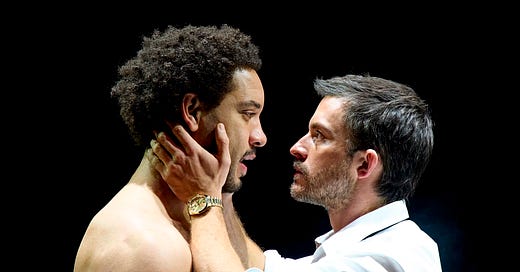Who you are and what you become is so often determined by the position in which you start.
What I’ve seen
All the plays I’ve seen this week consider that point to some degree. Richard II, Shakespeare’s 1595-ish History play looks at the conflict between Richard and his cousin Bolingbroke, who eventually usurped the throne to become Henry IV, despite the generally held belief that kings are chosen by God.
This production at the Bridge has been getting a lot of buzz because it stars the always highly watchable Jonathan Bailey, of Bridgerton and Wicked fame (I interviewed him a while ago, you can read that here). The show is directed by the theatre’s co-owner, and former artistic director of the National Theatre, Nick Hytner.
It is a perfectly good, solid production. Everyone is acting well, speaking the verse clearly and conversationally, it’s mostly possible to work out what is going on and why. Bailey is excellent as the wilful, changeable king whose cast-iron conviction of his divine right to rule without challenge will absolutely prove his downfall.
In this weird, corporate setting where everyone wears a suit when they’re not in the inevitable fatigues, Royce Pierreson is a decent Bolingbroke (whom they all pronounce Bullingbrook, I think because that’s the way it’s written in the First Folio, which seems like a slightly arbitrary nod to whatever authenticity is supposed to be in a production that includes the snorting of coke and the endless use of Ryman’s plastic folders). He’s especially good at expressing deep discomfort; his own growing ambition disturbs him even as his followers recognise his elevation as their best route up the greasy pole.
And the play explores some really interesting concepts: the divine right of kings, and indeed of God‘s will in general, and how inconsistently and conveniently man will always use the latter notion to justify his own ends.
When the always reliable Michael Simkins, as the Duke of York, says to his wife, “But heaven hath a hand in these events / To whose high will we bound our calm contents”, as they sit around their hilarious Cotswolds kitchen table (I’m pretty sure one if not both of them was wearing a gilet), you see a man working overtime to persuade himself that what he’s witness to, and, by his inaction, party to, must somehow be right. It’s that ancient, specious argument - “everything happens for a reason”.
So there’s a fair bit to like here, but God, the History plays are tricky. Most of them end a bit weirdly because they’re effectively setting up a sequel, which as all film fans know is the most unsatisfying end imaginable. It’s like getting to the end of Wicked (which has exactly the same running time, incidentally) and realising that there’s a whole other half of the story still to go.
Keep reading with a 7-day free trial
Subscribe to The London Culture Edit to keep reading this post and get 7 days of free access to the full post archives.





